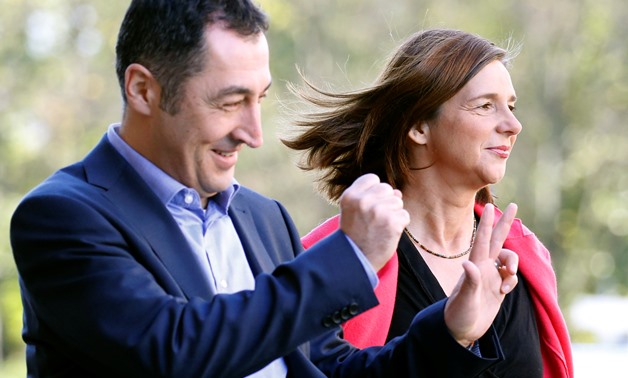
Leaders of the German Green Party Katrin Goering-Eckardt and Cem Ozdemir arrive at the German Parliamentary Society offices before the start of exploratory talks about forming a new coalition government in Berlin, Germany, October 30, 2017. REUTERS/Axel S
FRANKFURT - 5 November 2017: Germany's environmentalist Green party polled at its highest level this year in a survey published on Sunday, overtaking Chancellor Angela Merkel's other would-be coalition partner as talks to form a new government continued.
An coalition agreement would see Merkel extend her 12-year spell at Germany's helm, during which she has helped avoid a collapse of the euro zone and cemented her country's position as the bloc’s economic powerhouse.
Merkel must bring together the Greens, the pro-business Free Democrats (FDP) and her own conservative bloc to secure a majority, with sticking points including immigration caps, whether to end coal production and increasing defence spending.
The poll published by German daily Bild put the Greens at 11 percent, up by one percentage point from a week earlier, while the FDP fell by the same amount to 10 percent.
It will have no direct bearing on coalition talks, but gives the Greens some bragging rights in terms of their negotiating.
The Greens are calling for abandoning coal as a source of energy in Germany, an objective shared by thousands of demonstrators who marched in the German city of Bonn on Saturday but opposed by the FDP.
"If Germany wants to meet its climate protection goals, an exit from coal is necessary," Anton Hofreiter, one of the leaders of the Green's parliamentary party told Reuters on Sunday.
Merkel's Christian Democrats (CDU) and their Bavarian CSU sister party were stable at 31 percent while the Social Democrats, who have said they would not renew their ruling coalition with the conservatives, slipped by one percentage point to 21 percent.
Party leaders are slated to meet on Monday evening before the larger negotiating teams launch into more detailed talks.
The FDP leader, Christian Lindner, said in an interview published on Sunday his party did not fear new elections if the negotiations failed.
But a new vote could see more gains for the far-right Alternative for Germany (AfD), which surged into parliament last month after a campaign that channelled public anger at Merkel’s 2015 decision to leave Germany’s border open to migrants.
The euro-sceptic AfD was stable in Sunday's survey at 12 percent while left-wing Die Linke rose by one percentage point to poll to 10 percent.
Polling firm Emnid interviewed 1,476 people between 26 and 30 October.
A separate survey, carried out by pollster INSA in Bavaria, put Merkel's local ally, the CSU, at 37 percent, down from an already disappointing 38.9 percent at general elections on Sept. 24.
CSU leader Horst Seehofer has been fending off calls for his resignation since the vote. Bavaria was the main entry point for migrants to Germany in 2015 and the CSU wants a limit of 200,000 migrants a year.
The Bavarian survey, for which 1,033 people were polled on Nov 2-3, is due to appear in the Bild newspaper on Monday.


Comments
Leave a Comment